Optimizing Personal Growth: Time Management, SWOT, and SMART Goals
VerifiedAdded on 2023/06/10
|8
|2345
|160
Essay
AI Summary
This essay presents a comprehensive personal development plan, emphasizing the importance of time management for effective studying and impactful results. It includes an individual SWOT analysis to identify strengths, weaknesses, opportunities, and threats, alongside an outline of the SMART framework for goal setting (Specific, Measurable, Achievable, Realistic, Timely). The plan details strategies for improving time management skills, such as goal-setting, prioritization, organization, and stress management. It also discusses measures to enhance time management, including planning, creating timetables, starting tasks early, and avoiding multitasking. The essay concludes by highlighting how technology can facilitate learning and expand access to resources, ultimately fostering personal and academic growth. Desklib offers students access to similar solved assignments and study resources.
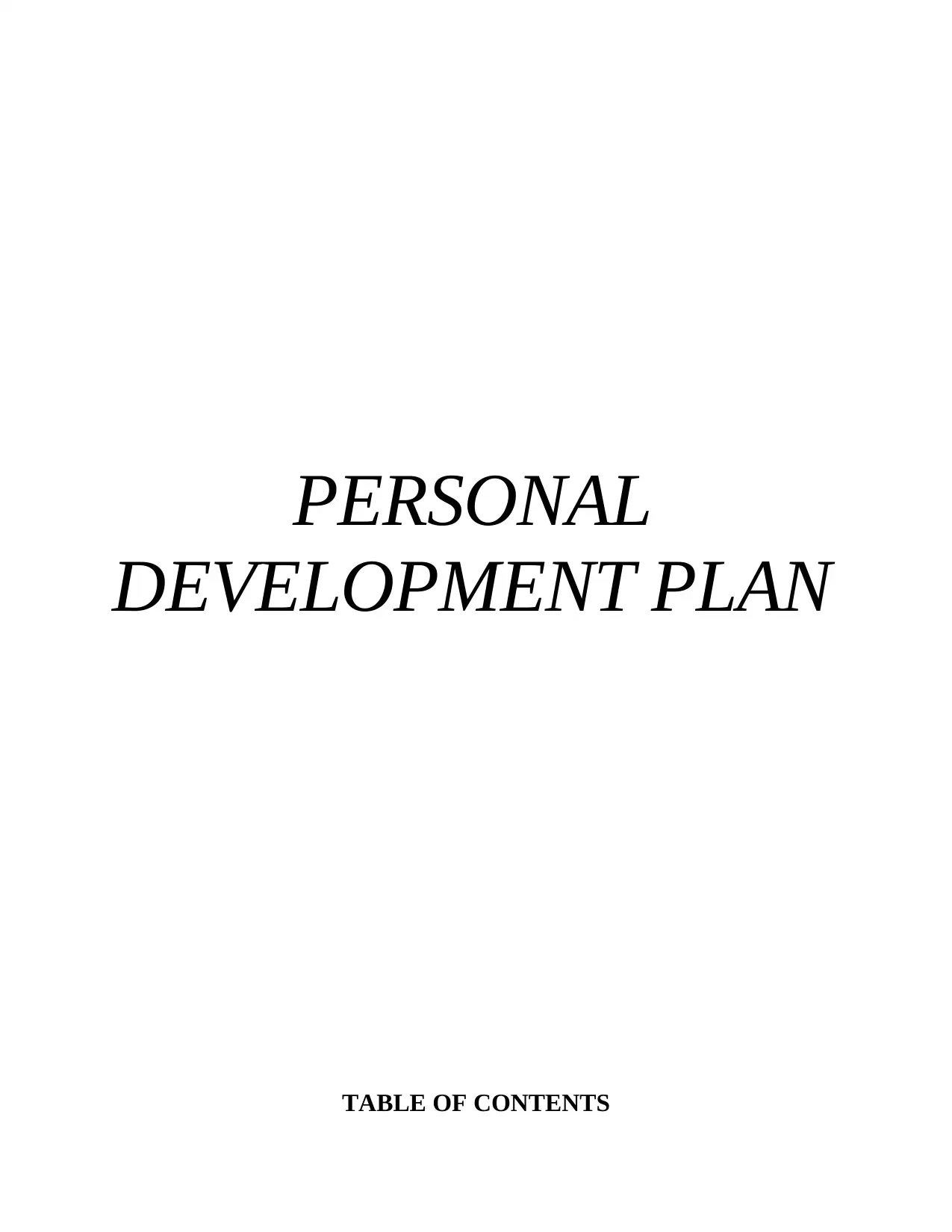
PERSONAL
DEVELOPMENT PLAN
TABLE OF CONTENTS
DEVELOPMENT PLAN
TABLE OF CONTENTS
Paraphrase This Document
Need a fresh take? Get an instant paraphrase of this document with our AI Paraphraser
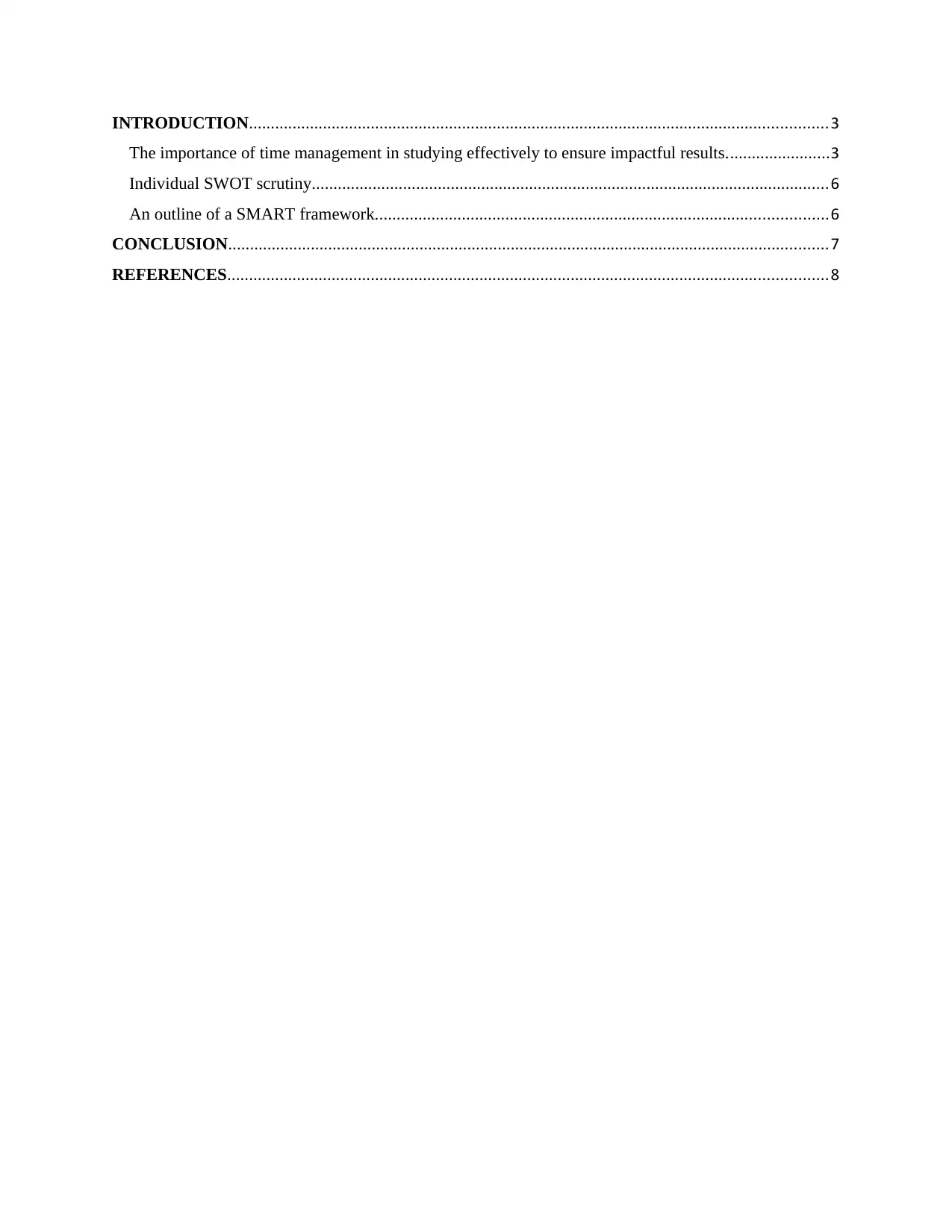
INTRODUCTION.....................................................................................................................................3
The importance of time management in studying effectively to ensure impactful results........................3
Individual SWOT scrutiny.......................................................................................................................6
An outline of a SMART framework........................................................................................................6
CONCLUSION..........................................................................................................................................7
REFERENCES..........................................................................................................................................8
The importance of time management in studying effectively to ensure impactful results........................3
Individual SWOT scrutiny.......................................................................................................................6
An outline of a SMART framework........................................................................................................6
CONCLUSION..........................................................................................................................................7
REFERENCES..........................................................................................................................................8
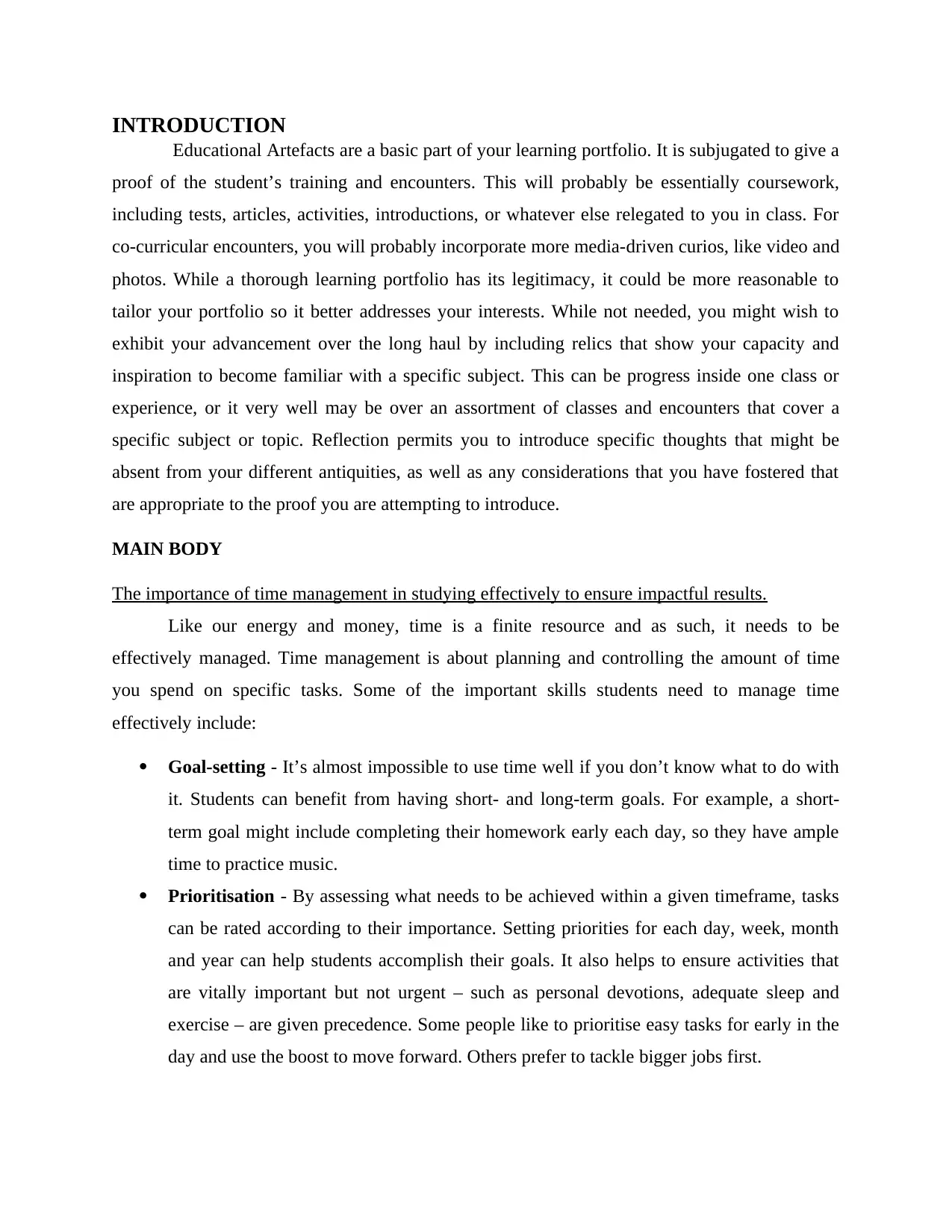
INTRODUCTION
Educational Artefacts are a basic part of your learning portfolio. It is subjugated to give a
proof of the student’s training and encounters. This will probably be essentially coursework,
including tests, articles, activities, introductions, or whatever else relegated to you in class. For
co-curricular encounters, you will probably incorporate more media-driven curios, like video and
photos. While a thorough learning portfolio has its legitimacy, it could be more reasonable to
tailor your portfolio so it better addresses your interests. While not needed, you might wish to
exhibit your advancement over the long haul by including relics that show your capacity and
inspiration to become familiar with a specific subject. This can be progress inside one class or
experience, or it very well may be over an assortment of classes and encounters that cover a
specific subject or topic. Reflection permits you to introduce specific thoughts that might be
absent from your different antiquities, as well as any considerations that you have fostered that
are appropriate to the proof you are attempting to introduce.
MAIN BODY
The importance of time management in studying effectively to ensure impactful results.
Like our energy and money, time is a finite resource and as such, it needs to be
effectively managed. Time management is about planning and controlling the amount of time
you spend on specific tasks. Some of the important skills students need to manage time
effectively include:
Goal-setting - It’s almost impossible to use time well if you don’t know what to do with
it. Students can benefit from having short- and long-term goals. For example, a short-
term goal might include completing their homework early each day, so they have ample
time to practice music.
Prioritisation - By assessing what needs to be achieved within a given timeframe, tasks
can be rated according to their importance. Setting priorities for each day, week, month
and year can help students accomplish their goals. It also helps to ensure activities that
are vitally important but not urgent – such as personal devotions, adequate sleep and
exercise – are given precedence. Some people like to prioritise easy tasks for early in the
day and use the boost to move forward. Others prefer to tackle bigger jobs first.
Educational Artefacts are a basic part of your learning portfolio. It is subjugated to give a
proof of the student’s training and encounters. This will probably be essentially coursework,
including tests, articles, activities, introductions, or whatever else relegated to you in class. For
co-curricular encounters, you will probably incorporate more media-driven curios, like video and
photos. While a thorough learning portfolio has its legitimacy, it could be more reasonable to
tailor your portfolio so it better addresses your interests. While not needed, you might wish to
exhibit your advancement over the long haul by including relics that show your capacity and
inspiration to become familiar with a specific subject. This can be progress inside one class or
experience, or it very well may be over an assortment of classes and encounters that cover a
specific subject or topic. Reflection permits you to introduce specific thoughts that might be
absent from your different antiquities, as well as any considerations that you have fostered that
are appropriate to the proof you are attempting to introduce.
MAIN BODY
The importance of time management in studying effectively to ensure impactful results.
Like our energy and money, time is a finite resource and as such, it needs to be
effectively managed. Time management is about planning and controlling the amount of time
you spend on specific tasks. Some of the important skills students need to manage time
effectively include:
Goal-setting - It’s almost impossible to use time well if you don’t know what to do with
it. Students can benefit from having short- and long-term goals. For example, a short-
term goal might include completing their homework early each day, so they have ample
time to practice music.
Prioritisation - By assessing what needs to be achieved within a given timeframe, tasks
can be rated according to their importance. Setting priorities for each day, week, month
and year can help students accomplish their goals. It also helps to ensure activities that
are vitally important but not urgent – such as personal devotions, adequate sleep and
exercise – are given precedence. Some people like to prioritise easy tasks for early in the
day and use the boost to move forward. Others prefer to tackle bigger jobs first.
⊘ This is a preview!⊘
Do you want full access?
Subscribe today to unlock all pages.

Trusted by 1+ million students worldwide
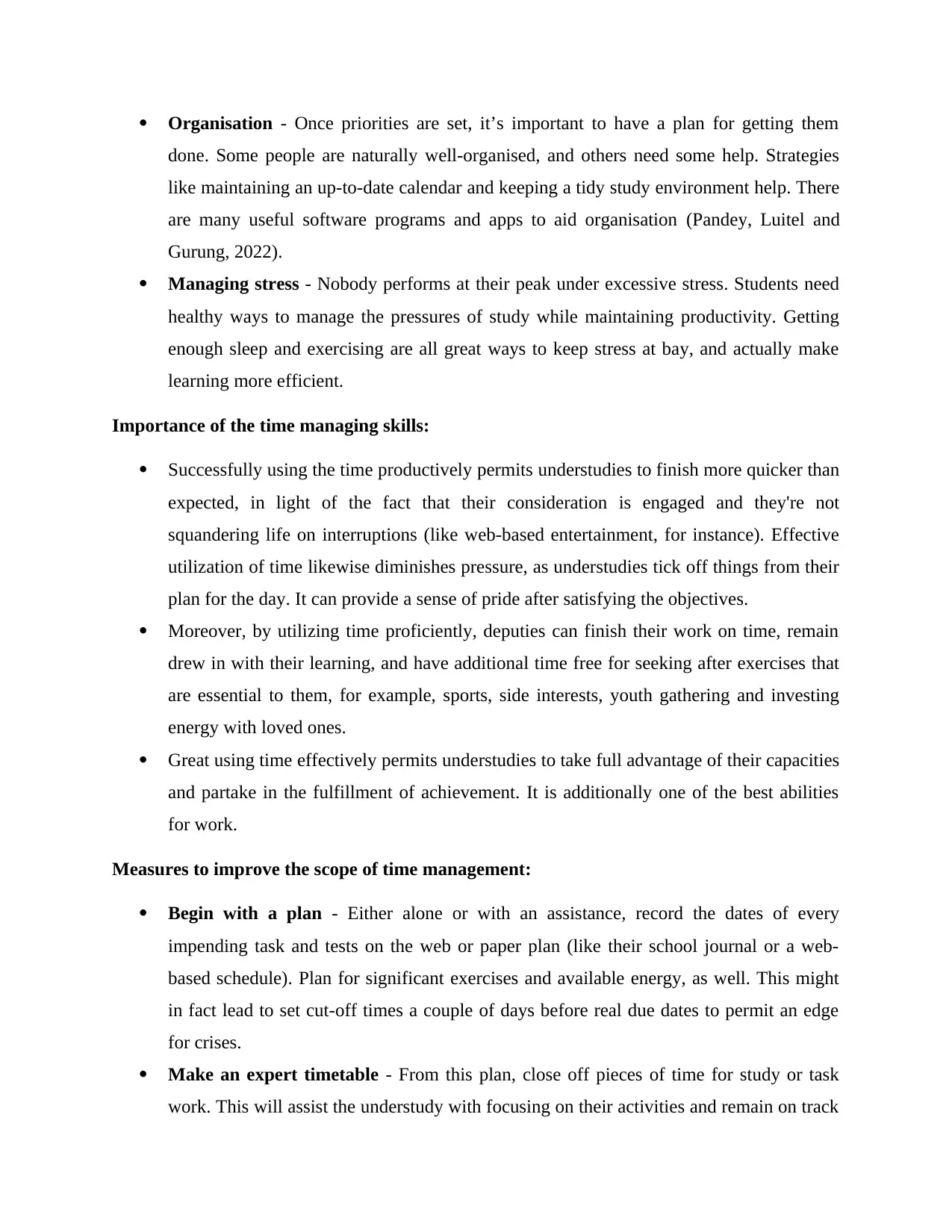
Organisation - Once priorities are set, it’s important to have a plan for getting them
done. Some people are naturally well-organised, and others need some help. Strategies
like maintaining an up-to-date calendar and keeping a tidy study environment help. There
are many useful software programs and apps to aid organisation (Pandey, Luitel and
Gurung, 2022).
Managing stress - Nobody performs at their peak under excessive stress. Students need
healthy ways to manage the pressures of study while maintaining productivity. Getting
enough sleep and exercising are all great ways to keep stress at bay, and actually make
learning more efficient.
Importance of the time managing skills:
Successfully using the time productively permits understudies to finish more quicker than
expected, in light of the fact that their consideration is engaged and they're not
squandering life on interruptions (like web-based entertainment, for instance). Effective
utilization of time likewise diminishes pressure, as understudies tick off things from their
plan for the day. It can provide a sense of pride after satisfying the objectives.
Moreover, by utilizing time proficiently, deputies can finish their work on time, remain
drew in with their learning, and have additional time free for seeking after exercises that
are essential to them, for example, sports, side interests, youth gathering and investing
energy with loved ones.
Great using time effectively permits understudies to take full advantage of their capacities
and partake in the fulfillment of achievement. It is additionally one of the best abilities
for work.
Measures to improve the scope of time management:
Begin with a plan - Either alone or with an assistance, record the dates of every
impending task and tests on the web or paper plan (like their school journal or a web-
based schedule). Plan for significant exercises and available energy, as well. This might
in fact lead to set cut-off times a couple of days before real due dates to permit an edge
for crises.
Make an expert timetable - From this plan, close off pieces of time for study or task
work. This will assist the understudy with focusing on their activities and remain on track
done. Some people are naturally well-organised, and others need some help. Strategies
like maintaining an up-to-date calendar and keeping a tidy study environment help. There
are many useful software programs and apps to aid organisation (Pandey, Luitel and
Gurung, 2022).
Managing stress - Nobody performs at their peak under excessive stress. Students need
healthy ways to manage the pressures of study while maintaining productivity. Getting
enough sleep and exercising are all great ways to keep stress at bay, and actually make
learning more efficient.
Importance of the time managing skills:
Successfully using the time productively permits understudies to finish more quicker than
expected, in light of the fact that their consideration is engaged and they're not
squandering life on interruptions (like web-based entertainment, for instance). Effective
utilization of time likewise diminishes pressure, as understudies tick off things from their
plan for the day. It can provide a sense of pride after satisfying the objectives.
Moreover, by utilizing time proficiently, deputies can finish their work on time, remain
drew in with their learning, and have additional time free for seeking after exercises that
are essential to them, for example, sports, side interests, youth gathering and investing
energy with loved ones.
Great using time effectively permits understudies to take full advantage of their capacities
and partake in the fulfillment of achievement. It is additionally one of the best abilities
for work.
Measures to improve the scope of time management:
Begin with a plan - Either alone or with an assistance, record the dates of every
impending task and tests on the web or paper plan (like their school journal or a web-
based schedule). Plan for significant exercises and available energy, as well. This might
in fact lead to set cut-off times a couple of days before real due dates to permit an edge
for crises.
Make an expert timetable - From this plan, close off pieces of time for study or task
work. This will assist the understudy with focusing on their activities and remain on track
Paraphrase This Document
Need a fresh take? Get an instant paraphrase of this document with our AI Paraphraser
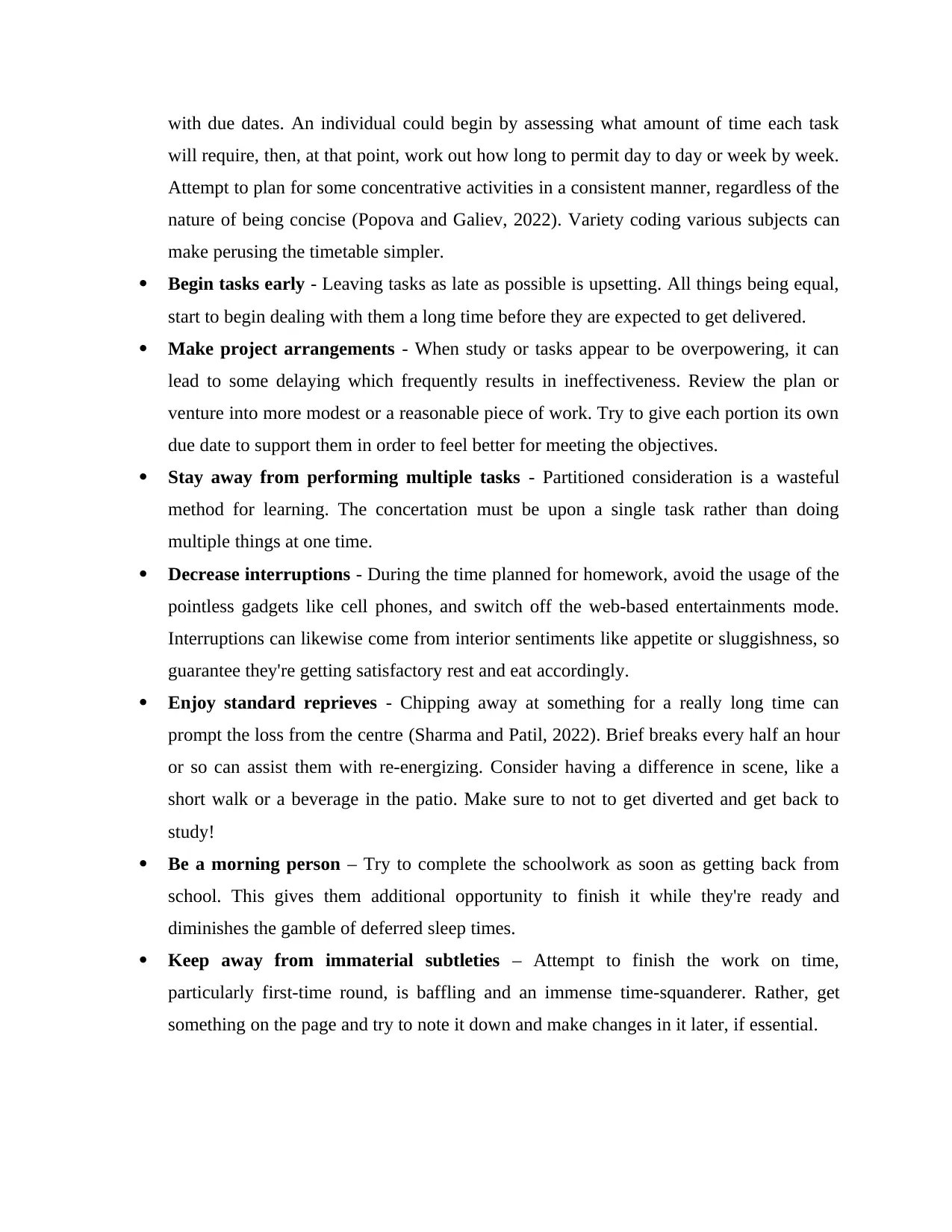
with due dates. An individual could begin by assessing what amount of time each task
will require, then, at that point, work out how long to permit day to day or week by week.
Attempt to plan for some concentrative activities in a consistent manner, regardless of the
nature of being concise (Popova and Galiev, 2022). Variety coding various subjects can
make perusing the timetable simpler.
Begin tasks early - Leaving tasks as late as possible is upsetting. All things being equal,
start to begin dealing with them a long time before they are expected to get delivered.
Make project arrangements - When study or tasks appear to be overpowering, it can
lead to some delaying which frequently results in ineffectiveness. Review the plan or
venture into more modest or a reasonable piece of work. Try to give each portion its own
due date to support them in order to feel better for meeting the objectives.
Stay away from performing multiple tasks - Partitioned consideration is a wasteful
method for learning. The concertation must be upon a single task rather than doing
multiple things at one time.
Decrease interruptions - During the time planned for homework, avoid the usage of the
pointless gadgets like cell phones, and switch off the web-based entertainments mode.
Interruptions can likewise come from interior sentiments like appetite or sluggishness, so
guarantee they're getting satisfactory rest and eat accordingly.
Enjoy standard reprieves - Chipping away at something for a really long time can
prompt the loss from the centre (Sharma and Patil, 2022). Brief breaks every half an hour
or so can assist them with re-energizing. Consider having a difference in scene, like a
short walk or a beverage in the patio. Make sure to not to get diverted and get back to
study!
Be a morning person – Try to complete the schoolwork as soon as getting back from
school. This gives them additional opportunity to finish it while they're ready and
diminishes the gamble of deferred sleep times.
Keep away from immaterial subtleties – Attempt to finish the work on time,
particularly first-time round, is baffling and an immense time-squanderer. Rather, get
something on the page and try to note it down and make changes in it later, if essential.
will require, then, at that point, work out how long to permit day to day or week by week.
Attempt to plan for some concentrative activities in a consistent manner, regardless of the
nature of being concise (Popova and Galiev, 2022). Variety coding various subjects can
make perusing the timetable simpler.
Begin tasks early - Leaving tasks as late as possible is upsetting. All things being equal,
start to begin dealing with them a long time before they are expected to get delivered.
Make project arrangements - When study or tasks appear to be overpowering, it can
lead to some delaying which frequently results in ineffectiveness. Review the plan or
venture into more modest or a reasonable piece of work. Try to give each portion its own
due date to support them in order to feel better for meeting the objectives.
Stay away from performing multiple tasks - Partitioned consideration is a wasteful
method for learning. The concertation must be upon a single task rather than doing
multiple things at one time.
Decrease interruptions - During the time planned for homework, avoid the usage of the
pointless gadgets like cell phones, and switch off the web-based entertainments mode.
Interruptions can likewise come from interior sentiments like appetite or sluggishness, so
guarantee they're getting satisfactory rest and eat accordingly.
Enjoy standard reprieves - Chipping away at something for a really long time can
prompt the loss from the centre (Sharma and Patil, 2022). Brief breaks every half an hour
or so can assist them with re-energizing. Consider having a difference in scene, like a
short walk or a beverage in the patio. Make sure to not to get diverted and get back to
study!
Be a morning person – Try to complete the schoolwork as soon as getting back from
school. This gives them additional opportunity to finish it while they're ready and
diminishes the gamble of deferred sleep times.
Keep away from immaterial subtleties – Attempt to finish the work on time,
particularly first-time round, is baffling and an immense time-squanderer. Rather, get
something on the page and try to note it down and make changes in it later, if essential.
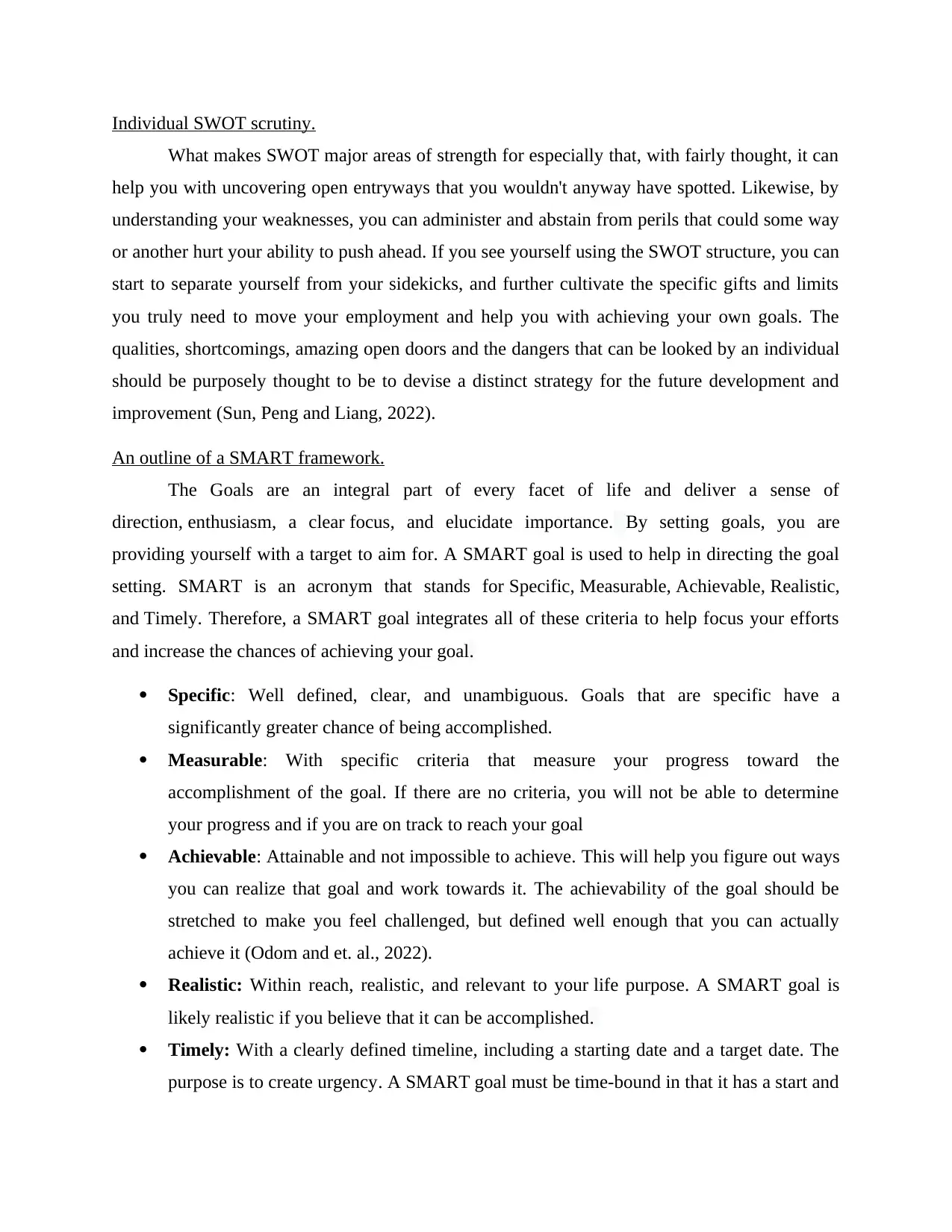
Individual SWOT scrutiny.
What makes SWOT major areas of strength for especially that, with fairly thought, it can
help you with uncovering open entryways that you wouldn't anyway have spotted. Likewise, by
understanding your weaknesses, you can administer and abstain from perils that could some way
or another hurt your ability to push ahead. If you see yourself using the SWOT structure, you can
start to separate yourself from your sidekicks, and further cultivate the specific gifts and limits
you truly need to move your employment and help you with achieving your own goals. The
qualities, shortcomings, amazing open doors and the dangers that can be looked by an individual
should be purposely thought to be to devise a distinct strategy for the future development and
improvement (Sun, Peng and Liang, 2022).
An outline of a SMART framework.
The Goals are an integral part of every facet of life and deliver a sense of
direction, enthusiasm, a clear focus, and elucidate importance. By setting goals, you are
providing yourself with a target to aim for. A SMART goal is used to help in directing the goal
setting. SMART is an acronym that stands for Specific, Measurable, Achievable, Realistic,
and Timely. Therefore, a SMART goal integrates all of these criteria to help focus your efforts
and increase the chances of achieving your goal.
Specific: Well defined, clear, and unambiguous. Goals that are specific have a
significantly greater chance of being accomplished.
Measurable: With specific criteria that measure your progress toward the
accomplishment of the goal. If there are no criteria, you will not be able to determine
your progress and if you are on track to reach your goal
Achievable: Attainable and not impossible to achieve. This will help you figure out ways
you can realize that goal and work towards it. The achievability of the goal should be
stretched to make you feel challenged, but defined well enough that you can actually
achieve it (Odom and et. al., 2022).
Realistic: Within reach, realistic, and relevant to your life purpose. A SMART goal is
likely realistic if you believe that it can be accomplished.
Timely: With a clearly defined timeline, including a starting date and a target date. The
purpose is to create urgency. A SMART goal must be time-bound in that it has a start and
What makes SWOT major areas of strength for especially that, with fairly thought, it can
help you with uncovering open entryways that you wouldn't anyway have spotted. Likewise, by
understanding your weaknesses, you can administer and abstain from perils that could some way
or another hurt your ability to push ahead. If you see yourself using the SWOT structure, you can
start to separate yourself from your sidekicks, and further cultivate the specific gifts and limits
you truly need to move your employment and help you with achieving your own goals. The
qualities, shortcomings, amazing open doors and the dangers that can be looked by an individual
should be purposely thought to be to devise a distinct strategy for the future development and
improvement (Sun, Peng and Liang, 2022).
An outline of a SMART framework.
The Goals are an integral part of every facet of life and deliver a sense of
direction, enthusiasm, a clear focus, and elucidate importance. By setting goals, you are
providing yourself with a target to aim for. A SMART goal is used to help in directing the goal
setting. SMART is an acronym that stands for Specific, Measurable, Achievable, Realistic,
and Timely. Therefore, a SMART goal integrates all of these criteria to help focus your efforts
and increase the chances of achieving your goal.
Specific: Well defined, clear, and unambiguous. Goals that are specific have a
significantly greater chance of being accomplished.
Measurable: With specific criteria that measure your progress toward the
accomplishment of the goal. If there are no criteria, you will not be able to determine
your progress and if you are on track to reach your goal
Achievable: Attainable and not impossible to achieve. This will help you figure out ways
you can realize that goal and work towards it. The achievability of the goal should be
stretched to make you feel challenged, but defined well enough that you can actually
achieve it (Odom and et. al., 2022).
Realistic: Within reach, realistic, and relevant to your life purpose. A SMART goal is
likely realistic if you believe that it can be accomplished.
Timely: With a clearly defined timeline, including a starting date and a target date. The
purpose is to create urgency. A SMART goal must be time-bound in that it has a start and
⊘ This is a preview!⊘
Do you want full access?
Subscribe today to unlock all pages.

Trusted by 1+ million students worldwide
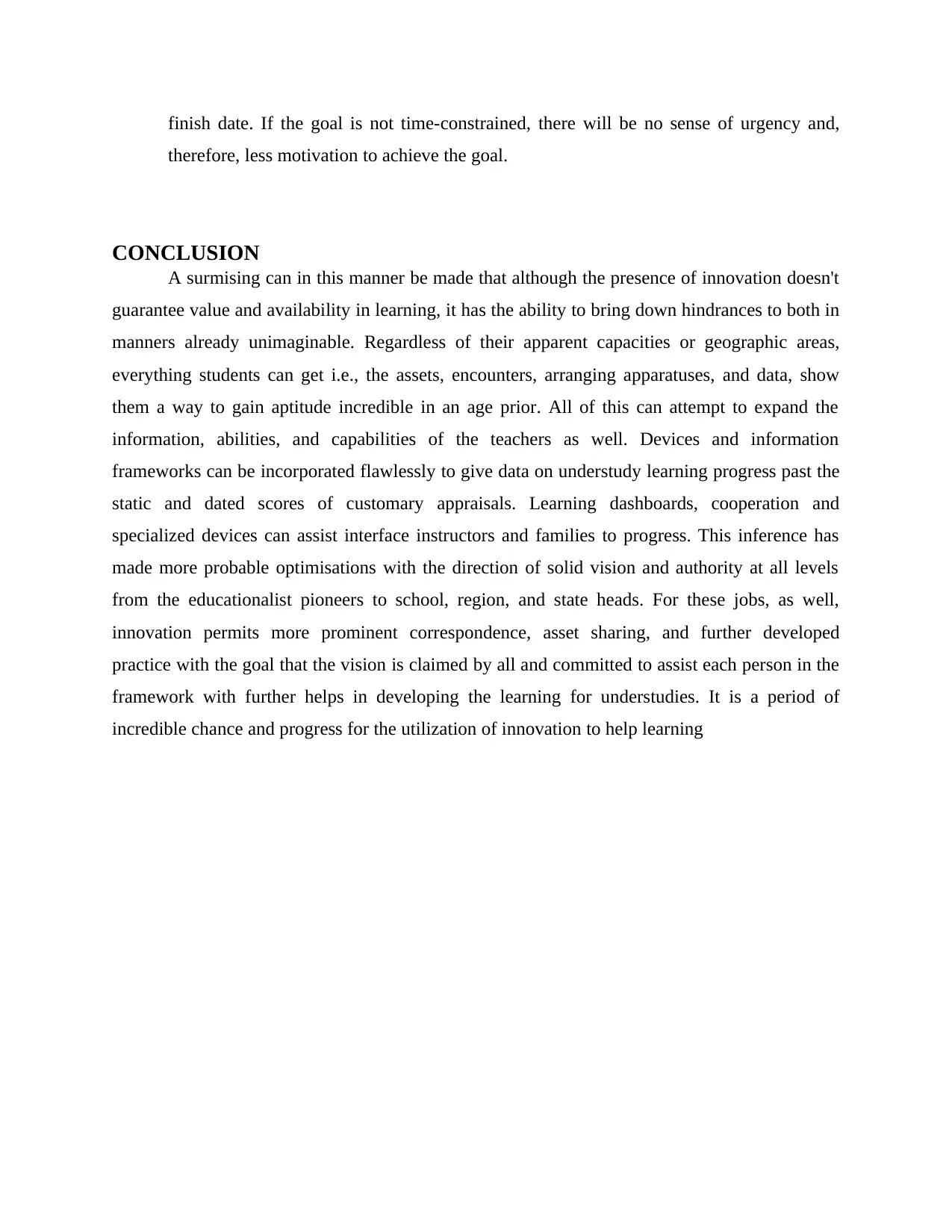
finish date. If the goal is not time-constrained, there will be no sense of urgency and,
therefore, less motivation to achieve the goal.
CONCLUSION
A surmising can in this manner be made that although the presence of innovation doesn't
guarantee value and availability in learning, it has the ability to bring down hindrances to both in
manners already unimaginable. Regardless of their apparent capacities or geographic areas,
everything students can get i.e., the assets, encounters, arranging apparatuses, and data, show
them a way to gain aptitude incredible in an age prior. All of this can attempt to expand the
information, abilities, and capabilities of the teachers as well. Devices and information
frameworks can be incorporated flawlessly to give data on understudy learning progress past the
static and dated scores of customary appraisals. Learning dashboards, cooperation and
specialized devices can assist interface instructors and families to progress. This inference has
made more probable optimisations with the direction of solid vision and authority at all levels
from the educationalist pioneers to school, region, and state heads. For these jobs, as well,
innovation permits more prominent correspondence, asset sharing, and further developed
practice with the goal that the vision is claimed by all and committed to assist each person in the
framework with further helps in developing the learning for understudies. It is a period of
incredible chance and progress for the utilization of innovation to help learning
therefore, less motivation to achieve the goal.
CONCLUSION
A surmising can in this manner be made that although the presence of innovation doesn't
guarantee value and availability in learning, it has the ability to bring down hindrances to both in
manners already unimaginable. Regardless of their apparent capacities or geographic areas,
everything students can get i.e., the assets, encounters, arranging apparatuses, and data, show
them a way to gain aptitude incredible in an age prior. All of this can attempt to expand the
information, abilities, and capabilities of the teachers as well. Devices and information
frameworks can be incorporated flawlessly to give data on understudy learning progress past the
static and dated scores of customary appraisals. Learning dashboards, cooperation and
specialized devices can assist interface instructors and families to progress. This inference has
made more probable optimisations with the direction of solid vision and authority at all levels
from the educationalist pioneers to school, region, and state heads. For these jobs, as well,
innovation permits more prominent correspondence, asset sharing, and further developed
practice with the goal that the vision is claimed by all and committed to assist each person in the
framework with further helps in developing the learning for understudies. It is a period of
incredible chance and progress for the utilization of innovation to help learning
Paraphrase This Document
Need a fresh take? Get an instant paraphrase of this document with our AI Paraphraser
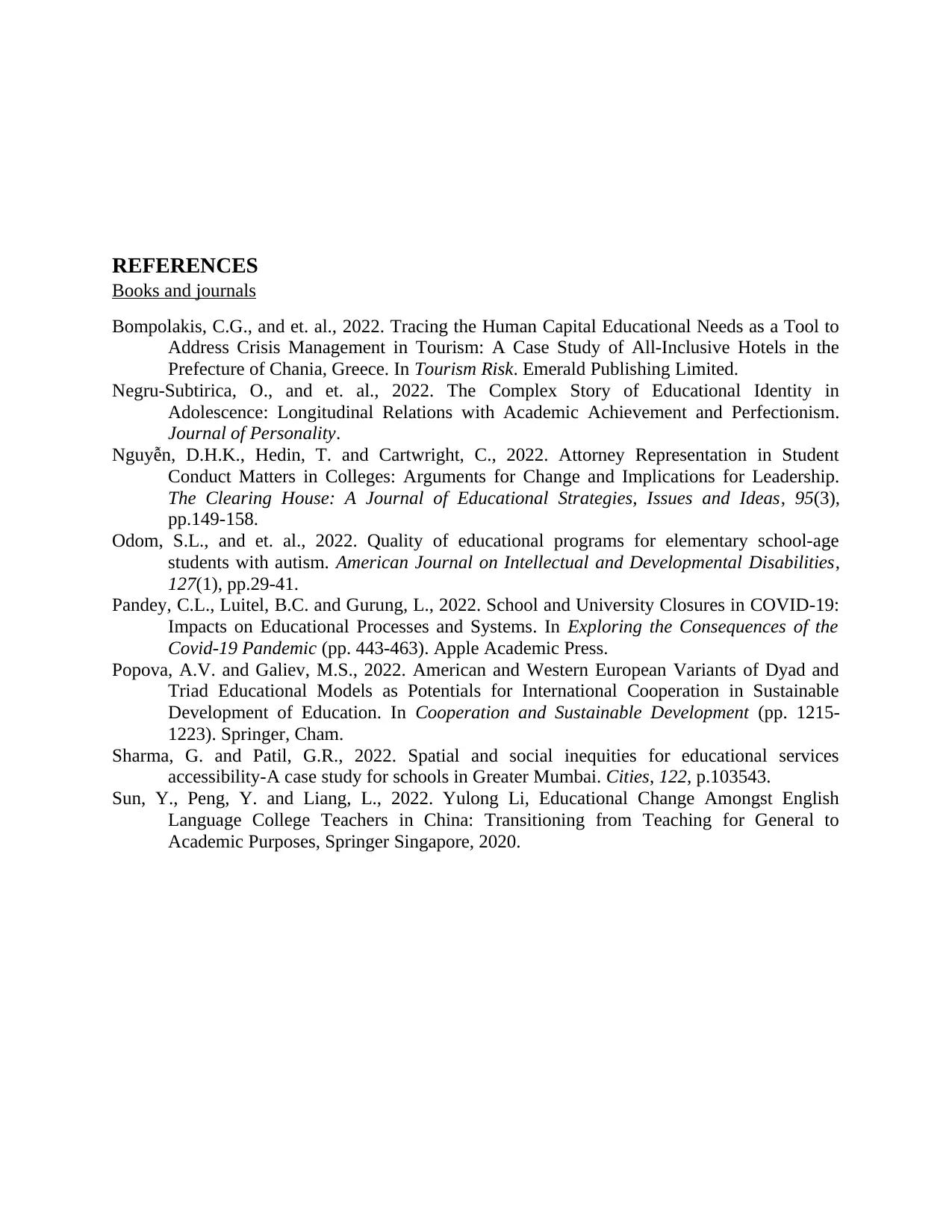
REFERENCES
Books and journals
Bompolakis, C.G., and et. al., 2022. Tracing the Human Capital Educational Needs as a Tool to
Address Crisis Management in Tourism: A Case Study of All-Inclusive Hotels in the
Prefecture of Chania, Greece. In Tourism Risk. Emerald Publishing Limited.
Negru‐Subtirica, O., and et. al., 2022. The Complex Story of Educational Identity in
Adolescence: Longitudinal Relations with Academic Achievement and Perfectionism.
Journal of Personality.
Nguyễn, D.H.K., Hedin, T. and Cartwright, C., 2022. Attorney Representation in Student
Conduct Matters in Colleges: Arguments for Change and Implications for Leadership.
The Clearing House: A Journal of Educational Strategies, Issues and Ideas, 95(3),
pp.149-158.
Odom, S.L., and et. al., 2022. Quality of educational programs for elementary school-age
students with autism. American Journal on Intellectual and Developmental Disabilities,
127(1), pp.29-41.
Pandey, C.L., Luitel, B.C. and Gurung, L., 2022. School and University Closures in COVID-19:
Impacts on Educational Processes and Systems. In Exploring the Consequences of the
Covid-19 Pandemic (pp. 443-463). Apple Academic Press.
Popova, A.V. and Galiev, M.S., 2022. American and Western European Variants of Dyad and
Triad Educational Models as Potentials for International Cooperation in Sustainable
Development of Education. In Сooperation and Sustainable Development (pp. 1215-
1223). Springer, Cham.
Sharma, G. and Patil, G.R., 2022. Spatial and social inequities for educational services
accessibility-A case study for schools in Greater Mumbai. Cities, 122, p.103543.
Sun, Y., Peng, Y. and Liang, L., 2022. Yulong Li, Educational Change Amongst English
Language College Teachers in China: Transitioning from Teaching for General to
Academic Purposes, Springer Singapore, 2020.
Books and journals
Bompolakis, C.G., and et. al., 2022. Tracing the Human Capital Educational Needs as a Tool to
Address Crisis Management in Tourism: A Case Study of All-Inclusive Hotels in the
Prefecture of Chania, Greece. In Tourism Risk. Emerald Publishing Limited.
Negru‐Subtirica, O., and et. al., 2022. The Complex Story of Educational Identity in
Adolescence: Longitudinal Relations with Academic Achievement and Perfectionism.
Journal of Personality.
Nguyễn, D.H.K., Hedin, T. and Cartwright, C., 2022. Attorney Representation in Student
Conduct Matters in Colleges: Arguments for Change and Implications for Leadership.
The Clearing House: A Journal of Educational Strategies, Issues and Ideas, 95(3),
pp.149-158.
Odom, S.L., and et. al., 2022. Quality of educational programs for elementary school-age
students with autism. American Journal on Intellectual and Developmental Disabilities,
127(1), pp.29-41.
Pandey, C.L., Luitel, B.C. and Gurung, L., 2022. School and University Closures in COVID-19:
Impacts on Educational Processes and Systems. In Exploring the Consequences of the
Covid-19 Pandemic (pp. 443-463). Apple Academic Press.
Popova, A.V. and Galiev, M.S., 2022. American and Western European Variants of Dyad and
Triad Educational Models as Potentials for International Cooperation in Sustainable
Development of Education. In Сooperation and Sustainable Development (pp. 1215-
1223). Springer, Cham.
Sharma, G. and Patil, G.R., 2022. Spatial and social inequities for educational services
accessibility-A case study for schools in Greater Mumbai. Cities, 122, p.103543.
Sun, Y., Peng, Y. and Liang, L., 2022. Yulong Li, Educational Change Amongst English
Language College Teachers in China: Transitioning from Teaching for General to
Academic Purposes, Springer Singapore, 2020.
1 out of 8
Related Documents
Your All-in-One AI-Powered Toolkit for Academic Success.
+13062052269
info@desklib.com
Available 24*7 on WhatsApp / Email
![[object Object]](/_next/static/media/star-bottom.7253800d.svg)
Unlock your academic potential
Copyright © 2020–2026 A2Z Services. All Rights Reserved. Developed and managed by ZUCOL.




